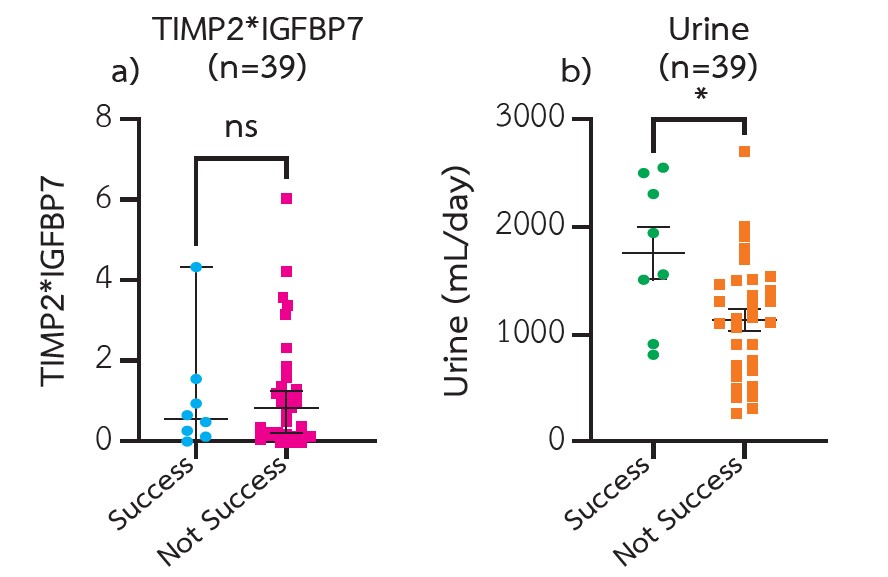The Association Between Urine TIMP-2*IGFBP7 and Successful Discontinuation of Renal Replacement Therapy in Patients with Acute Kidney Injury: A Prospective Observational Study
Main Article Content
Abstract
Background: Currently, there are no recommendations in terms of timing for discontinuation of intermittent kidney replacement therapy (IKRT) in acute kidney injury (AKI). Cell cycle arrest biomarkers including urine tissue inhibitor of metalloproteinase-2 (TIMP2) and urine insulin-like growth factor binding protein-7 (IGFBP7) have been shown to have good performance in predicting AKI in different groups of patients. Recent evidence also suggests the ability of urine cell cycle arrest biomarkers in predicting renal recovery. The present study evaluated the association between urine TIMP2*IGFBP7 levels and successful discontinuation of intermittent hemodialysis in patients with AKI.
Methods: We prospectively enrolled medical and surgical patients who were diagnosed with AKI based on KDIGO 2012 criteria and required intermittent hemodialysis from July 2021 to January 2022. Urine volume, serum creatinine, and urine TIMP2*IGFBP7 were measured before every session of hemodialysis that was likely to be the last session. The primary outcome was the successful discontinuation of IKRT for 14 days.
Results: Thirty-nine sessions of hemodialysis from 17 patients were included. Successful termination of IKRT for 14 days followed 8 (20.51%) of the 39 sessions. There was no association between urine TIMP2*IGFBP7 and the outcome with the area under the receiver operating characteristic curve (AUC) of 0.55 [95% confidential interval (CI) 0.32-0.77, P=0.66]. On the other hand, 24-hour urine volume prior to hemodialysis session had a fair performance in predicting successful discontinuation of IKRT with the AUC of 0.76 [95% CI 0.56-0.96, P=0.023]. The optimal cut-point of urine volume was >1,478 ml/day (Youden’s index 0.49)
Conclusion: There was no association between urine TIMP2*IGFBP7 levels and successful discontinuation of IKRT in patients with AKI. 24-hour urine volume prior to hemodialysis session showed a fair predictive performance of renal recovery.
Article Details

This work is licensed under a Creative Commons Attribution-NonCommercial-NoDerivatives 4.0 International License.
This article is published under CC BY-NC-ND 4.0 license, which allows for non-commercial reuse of the published paper as long as the published paper is fully attributed. Anyone can share (copy and redistribute) the material in any medium or format without having to ask permission from the author or the Nephrology Society of Thailand.
References
References
Viallet N, Brunot V, Kuster N, et al. Daily urinary creatinine predicts the weaning of renal replacement therapy in ICU acute kidney injury patients. Ann Intensive Care. 2016;6(1):71.
Bellomo R, Kellum JA, Ronco C. Acute kidney injury. Lancet. 2012;380(9843):756-66.
Coca SG, Singanamala S, Parikh CR. Chronic kidney disease after acute kidney injury: a systematic review and meta‐analysis. Kidney Int. 2012;81:442–8.
The 2012 Kidney Disease: Improving Global Outcomes (KDIGO) Clinical Practice Guideline for AKI Kidney International Supplement. 2012;1:2.
Katulka, R.J., Al Saadon, A., Sebastianski, M. et al. Determining the optimal time for liberation from renal replacement therapy in critically ill patients: a systematic review and meta-analysis (DOnE RRT). Crit Care. 2020;24(1):50.
Jeon J, Kim DH, Baeg SI, et al. Association between diuretics and successful discontinuation of continuous renal replacement therapy in critically ill patients with acute kidney injury. Crit Care. 2018;22(1):255.
Uchino S, Bellomo R, Morimatsu H, et al. Discontinuation of continuous renal replacement therapy: a post hoc analysis of a prospective multicenter observational study. Crit Care Med. 2009;37(9):2576–82.
Liu C, Lu X, Mao Z, et al. The diagnostic accuracy of urinary [TIMP-2]·[IGFBP7] for acute kidney injury in adults: A PRISMA-compliant meta-analysis. Medicine (Baltimore). 2017;96(27):e7484.
Guzzi, L.M., Bergler, T., Binnall, B. et al. Clinical use of [TIMP-2]•[IGFBP7] biomarker testing to assess risk of acute kidney injury in critical care: guidance from an expert panel. Crit Care 2019 ;23(1):225.
Schanz M, Shi J, Wasser C, Alscher MD, Kimmel M. Urinary [TIMP-2] × [IGFBP7] for risk prediction of acute kidney injury in decompensated heart failure. Clin Cardiol. 2017;40(7):485-91.
Wang, Y., Zou, Z., Jin, J. et al. Urinary TIMP-2 and IGFBP7 for the prediction of acute kidney injury following cardiac surgery. BMC Nephrol. 2017;18(1):177.
Yang QH, Liu DW, Long Y, et al. (2009) Acute renal failure during sepsis: potential role of cell cycle regulation. J Infect. 2009;58(6):459-64.
Jia, HM., Cheng, L., Weng, YB. et al. Cell cycle arrest biomarkers for predicting renal recovery from acute kidney injury: a prospective validation study. Ann. Intensive Care 2022;12(1):14.
Meersch M, Schmidt C, Van Aken H, et al. Urinary TIMP-2 and IGFBP7 as early biomarkers of acute kidney injury and renal recovery following cardiac surgery. PLoS One. 2014;9(3):e93460.


